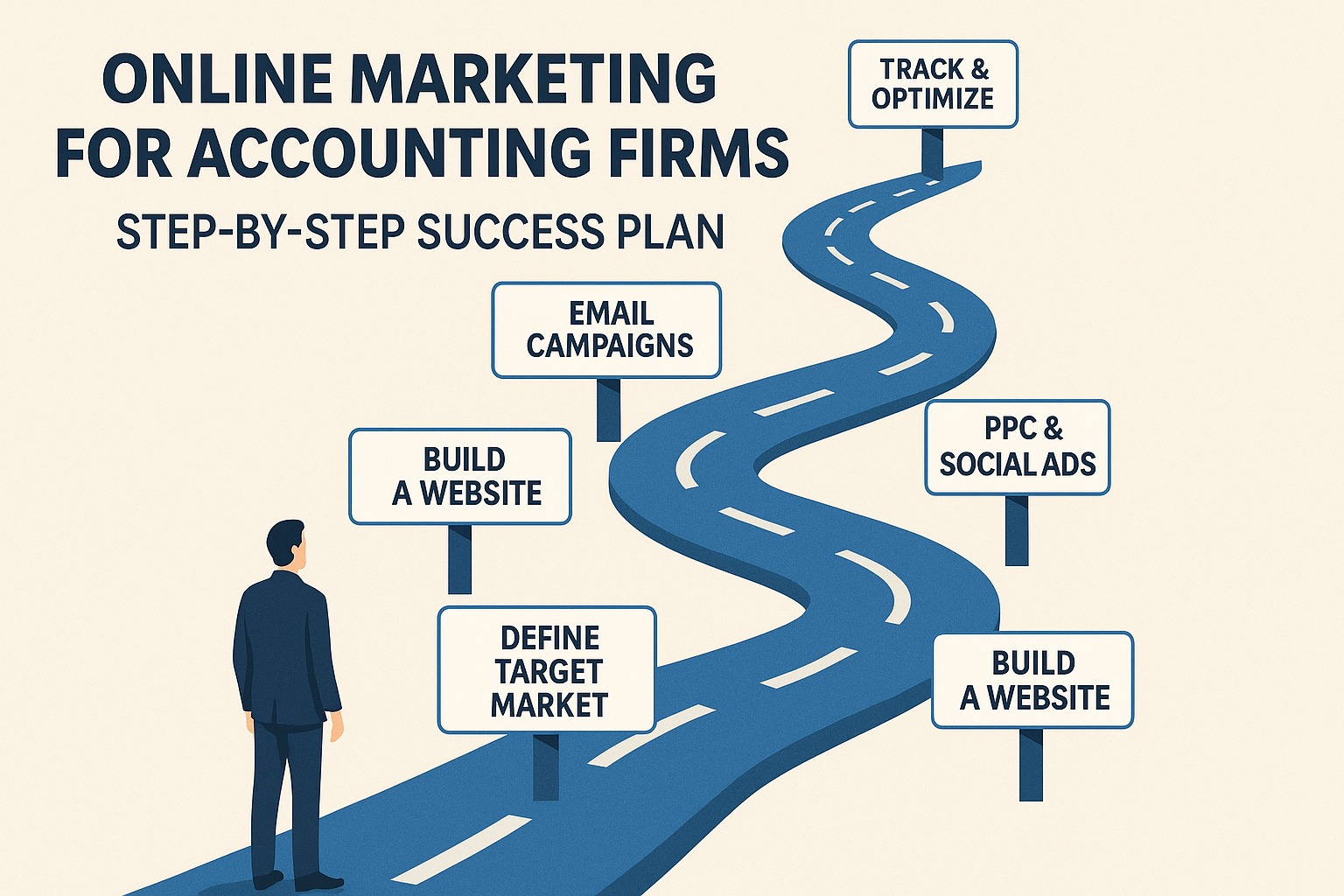The game has changed, and accounting firms that once relied on referrals and word-of-mouth are now winning big through online marketing. This guide breaks down a step-by-step plan tailored specifically for accounting professionals. If you’re looking to turn website clicks into client calls and ad spend into ROI, you’re in the right place. Let’s map out your digital growth strategy—one smart step at a time.
In this guide, we promise actionable solutions. We’ll cover key channels—SEO, PPC advertising for accounting firms, social media, email, and content marketing—and explain how each can generate leads. Combine these tactics into a comprehensive marketing strategy for accounting firms, and your website can evolve into a strategic hub for driving qualified leads and appointments. Mastering online marketing for accounting firms means applying these tactics consistently and measuring results.
Channels & Tactics for Online Marketing For Accounting Firms
In the digital age, clients start their search online, so your firm must be visible there. QuickBooks reports that “digital marketing is one of the best ways for accounting firms to market their services” and notes it’s “exceptionally cost-effective”(QuickBooks).
Unlike broad traditional ads, online marketing lets you target your ideal clients for better ROI. Tactics like SEO, content, social media, and paid ads work together to build credibility and attract prospects. Harnessing online marketing for accounting firms means applying these tactics consistently and tracking your progress.
Search Engine Optimization (SEO)
SEO is essential for making your site discoverable. Use relevant keywords (like “tax accountant [Your City]”) in your content, titles, and headings so clients can find you online. Include local signals too: claim your Google Business Profile, ensure your contact info is consistent, and encourage client reviews. Optimize site speed and mobile usability—fast, mobile-friendly sites rank higher. Implementing web portal development services can provide clients with a secure, centralized platform to access financial documents and communicate with your team, enhancing user experience and trust.
- Use keywords
Include target terms in page titles, meta descriptions, and body text (e.g., “CPA [City]”).
- Local SEO
Claim Google Business Profile and keep directory listings updated and consistent.
- Helpful content
Publish blog posts or guides answering common client questions.
- Technical SEO
Ensure your site loads fast, is mobile-friendly, and uses HTTPS.
Good SEO means your firm shows up on page 1 and brings in a steady stream of leads.
Pay-Per-Click (PPC) Advertising
PPC (pay-per-click) ads allow precise targeting. You bid on keywords like “CPA [Your City]” or select audiences (e.g., by job title on LinkedIn). Ads show above search results or in users’ feeds. Write clear ads with a strong call-to-action and link them to dedicated landing pages. Always track conversions. Thomson Reuters warns that many campaigns fail if you don’t target the right audience(thomsonreuters.com). A well-managed PPC campaign delivers a steady stream of qualified inquiries. To manage costs effectively, many firms opt for Offshore Web Development Services, ensuring high-quality website development and maintenance without exceeding budget constraints.
- Target keywords
Use relevant terms and keywords to focus on qualified clicks.
- Compelling ads
Clearly state your offer and link to a matching landing page.
- Measure and adjust
Track conversions, pause low performers, and boost effective ads.
- Optimize spend
Set budgets and bids; invest more in high-converting keywords.
PPC is beneficial for quick results and driving new leads while SEO efforts grow.
Social Media Marketing
Social media builds credibility and trust with clients. LinkedIn is ideal for business networking; Facebook and Instagram reach local clients. Share helpful content (tax tips, industry news) and use visuals or short videos. Engage followers by replying to comments. Consistent posting (at least weekly) keeps your firm top-of-mind. Paid social ads (e.g., boosting a post) can further extend reach and attract business owners.
- Platform
Use LinkedIn for networking; Facebook/Instagram for local outreach.
- Consistent posting
Share tips or news weekly to stay on followers’ radar.
- Use visuals
Infographics and videos get more engagement.
- Targeted ads
Boost posts or run ads to reach specific audiences (e.g., local entrepreneurs).
Social media may not bring instant leads alone, but it reinforces your brand and drives site visits.
Email Marketing
Email marketing remains a cost-effective way to nurture leads and retain clients. Collect email addresses via your website or events, then send regular newsletters with useful content (tax reminders, financial tips, or firm news). Segment your list (e.g., businesses vs. individuals) so each group sees relevant messages. Use an email tool to automate sequences (welcome emails, follow-ups, tax-deadline reminders). Always include a clear call-to-action (like “Schedule a free consult”).
- Segment
Tailor emails to business vs. individual clients.
- Automate
Use drip campaigns (welcome emails, reminders) to guide leads.
- Provide value
Share helpful tips or resources in each email.
- Analyze
Monitor open and click rates and refine content accordingly.
Done right, email keeps your firm top-of-mind and helps move prospects through your pipeline.
Content Marketing
Content marketing demonstrates your expertise and attracts clients. Write blog posts or guides on topics clients care about (e.g., “How to choose a bookkeeping service” or “Tax tips for small businesses”). Use visuals (charts, infographics, short videos) to simplify complex topics. Share your content via email and social media. High-quality content builds trust and positions your firm as a helpful authority—each useful article or video is a lead magnet.
- Answer questions
Write about common accounting issues and solutions.
- Offer resources
Provide free guides or checklists in exchange for email sign-ups.
- Repurpose
Turn popular posts into videos or infographics to reach more people.
- Promote content
Share new articles on social media and in newsletters.
Advertising for Accounting Firms
Beyond organic tactics, targeted advertising for accounting firms amplifies your reach. This includes Google Ads, LinkedIn sponsored posts, Facebook/Instagram ads, and similar campaigns. For example, you might run a Google Ad for “tax consultant [City]” or a Facebook ad offering a free consultation to local small businesses. Every ad should highlight a clear offer and link to a dedicated landing page. Track cost per lead by measuring conversions (calls or form submissions). A well-managed ad campaign brings in clients who wouldn’t find you organically, complementing your organic efforts.
- Retarget: Re-engage visitors who left your site without converting.
- Multi-channel: Try ads on Google, LinkedIn, and Facebook; see which performs best.
- Test: A/B test ad creatives and audiences; invest more in what works.
- Adjust budget: Shift spend to high-converting campaigns; pause weak ads.
Combine advertising with your content and SEO: for example, sponsor a successful blog post to reach a broader audience. Effective advertising for accounting firms is always specific and measurable.
Crafting a Marketing Strategy for Accounting Firms
A cohesive marketing strategy ties all these tactics together. Start by defining your ideal clients and setting clear goals. Plan your mix of tactics (SEO, content, social, ads) and schedule (a content calendar and campaign timeline). Ensure consistent branding and messaging across all channels. Finally, decide which metrics to track (web traffic, leads, conversions) so you know what’s working.
- Define audience
Specify the industries or client types you want (e.g., small businesses, freelancers).
- Set goals
Choose measurable targets (e.g., leads per month, website traffic).
- Plan content
Schedule blog posts, emails, and ad campaigns on a calendar.
- Be consistent
Use uniform branding and voice on your site, ads, and social.
- Review metrics
Check analytics regularly and adjust your tactics.
A strong marketing strategy for accounting firms ensures each activity works toward the same growth objectives. By tying together SEO, advertising, and content under one plan, your efforts reinforce each other and drive real results.
Tools, Tips, and Common Mistakes
Use the right tools to power your marketing. Set up Google Analytics and Search Console to track your website traffic. Use a CRM to capture leads from forms and manage follow-ups. Ensure your site is fast and mobile-friendly: compress images, enable caching, and use a responsive design. Add structured data like LocalBusiness and FAQ schema to improve your search listings.
Avoid these mistakes: ignoring mobile users, neglecting site speed, or using vague messaging. Always guide visitors on what to do next (call, email, sign up). Test and tweak: A/B test headlines, ads, and pages to see what converts. Even small optimizations—like faster pages or proper schema—can significantly improve results.
- Mobile site: Ensure fast load times and a smooth phone experience.
- Schema markup: Use structured data (LocalBusiness, FAQ) to boost search listings.
- Automation: Use a CRM and email/social schedulers to streamline tasks.
- Test & refine: Continuously A/B test and refine based on performance data.
Conclusion
In summary, online marketing for accounting firms requires multiple channels working together. SEO and content drive organic traffic, social media builds trust, and targeted ads (advertising for accounting firms) bring in immediate leads. By combining these tactics into a coherent marketing strategy for accounting firms, every effort reinforces the others. By measuring and refining these efforts, you continually improve your online marketing for accounting firms ROI. The result is a steady stream of qualified leads.
If you’re ready to grow your firm, consider partnering with a specialized marketing team that understands accounting.
Ready to grow your firm? Contact us today and let us show you how Online Marketing For Accounting Firms can deliver real results!
Frequently Asked Questions
- How can online marketing for accounting firms help grow clients?
Online marketing for accounting firms expands your reach beyond referrals. SEO and helpful content get you found on Google, while targeted ads (like Google or LinkedIn) put your firm in front of the right audience immediately. Social media and email keep you top-of-mind. This targeted approach generates more qualified leads and a higher ROI over time. Partnering with a Fintech SEO Agency can help tailor your SEO strategies to the financial sector, ensuring compliance and attracting the right clientele.
- What channels should accounting firms focus on?
A balanced approach usually works best. Focus on SEO (for search visibility), content marketing (blogs, guides), social media (for engagement), email (to nurture leads), and strategic paid ads (for quick results). The mix depends on your goals. Track which channels drive inquiries and adjust your strategy accordingly.
- Why is advertising important for accounting firms?
Paid advertising for accounting firms (such as Google Ads or Facebook/LinkedIn ads) provides immediate exposure. It targets specific keywords or demographics so potential clients see you when they search for services. This targeted advertising often brings in qualified leads more quickly. Every click or inquiry is measurable, letting you optimize spend for the best ROI.
- What makes an effective online marketing strategy for accounting firms?
A successful online marketing strategy for accounting firms starts with clear goals and audience definitions. Identify your ideal clients and outline how each tactic (SEO, content, ads, social) serves them. Maintain consistent branding and messaging. Plan a schedule for content and campaigns, and measure key metrics (traffic, leads, conversions). Regularly review results and refine your approach. In short, every element should work toward the same defined goals.


